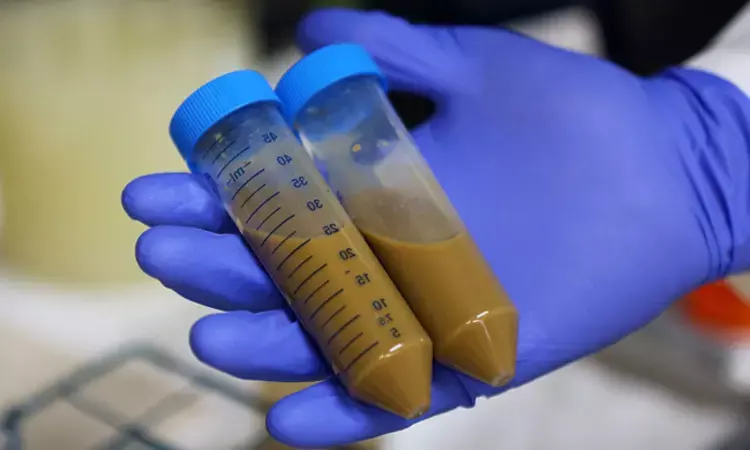- Home
- Medical news & Guidelines
- Anesthesiology
- Cardiology and CTVS
- Critical Care
- Dentistry
- Dermatology
- Diabetes and Endocrinology
- ENT
- Gastroenterology
- Medicine
- Nephrology
- Neurology
- Obstretics-Gynaecology
- Oncology
- Ophthalmology
- Orthopaedics
- Pediatrics-Neonatology
- Psychiatry
- Pulmonology
- Radiology
- Surgery
- Urology
- Laboratory Medicine
- Diet
- Nursing
- Paramedical
- Physiotherapy
- Health news
- Fact Check
- Bone Health Fact Check
- Brain Health Fact Check
- Cancer Related Fact Check
- Child Care Fact Check
- Dental and oral health fact check
- Diabetes and metabolic health fact check
- Diet and Nutrition Fact Check
- Eye and ENT Care Fact Check
- Fitness fact check
- Gut health fact check
- Heart health fact check
- Kidney health fact check
- Medical education fact check
- Men's health fact check
- Respiratory fact check
- Skin and hair care fact check
- Vaccine and Immunization fact check
- Women's health fact check
- AYUSH
- State News
- Andaman and Nicobar Islands
- Andhra Pradesh
- Arunachal Pradesh
- Assam
- Bihar
- Chandigarh
- Chattisgarh
- Dadra and Nagar Haveli
- Daman and Diu
- Delhi
- Goa
- Gujarat
- Haryana
- Himachal Pradesh
- Jammu & Kashmir
- Jharkhand
- Karnataka
- Kerala
- Ladakh
- Lakshadweep
- Madhya Pradesh
- Maharashtra
- Manipur
- Meghalaya
- Mizoram
- Nagaland
- Odisha
- Puducherry
- Punjab
- Rajasthan
- Sikkim
- Tamil Nadu
- Telangana
- Tripura
- Uttar Pradesh
- Uttrakhand
- West Bengal
- Medical Education
- Industry
Fecal microbiota transplants improve metabolic syndrome in obese patients

A recent systematic review published in the Diabetes Research and Clinical Practice found the effect of fecal microbiota transplantation (FMT) on microbiota engraftment in patients with metabolic syndrome. The research team led by Li Zecheng conducted an extensive search across major databases and grey literature, identifying RCTs that compared FMT from lean donors to placebo in obese/metabolic syndrome patients. All studies utilizing any form of placebo were included in the analysis. The team then calculated variations in the parameters before and after treatment, followed by comprehensive meta-analyses.
After meticulous analysis, ten studies were deemed eligible, comprising a total of 334 patients who met the inclusion criteria. They delved into clinically significant parameters associated with obesity and metabolic syndrome, assessing the association between FMT and these parameters.
The findings revealed that FMT was significantly and negatively associated with various indices of abdominal adiposity, including caloric intake, fasting glucose, HOMA-IR, systolic and diastolic blood pressure, total cholesterol, HDL, LDL, triglycerides, and CRP. Interestingly, fasting glucose and acetic acid levels were found to increase following FMT, indicating potential changes in obesity-related parameters.
This systematic review and meta-analysis provide valuable insights into the potential advantages of FMT in obese patients with elevated blood pressure, disordered glucose and insulin metabolism, and elevated blood lipids. By addressing these metabolic factors in obese patients, FMT may serve as a promising starting point for future research in the field.
The implications of this study are far-reaching, as obesity and metabolic syndrome continue to pose significant health challenges worldwide. FMT offers a novel approach to target the underlying factors contributing to these conditions by modulating the gut microbiota. As we unravel the intricate relationship between the gut microbiome and metabolic health, FMT holds the potential to revolutionize the treatment landscape for obesity and metabolic syndrome.
While this systematic review shed light on the benefits of FMT in specific patient populations, further research is still warranted to elucidate the long-term effects, optimal treatment protocols, and potential risks associated with FMT. With ongoing advancements in microbiome research and therapeutic interventions, FMT represents a promising avenue for addressing the complex nature of obesity and metabolic syndrome.
Source:
Zecheng, L., Donghai, L., Runchuan, G., Yuan, Q., Qi, J., Yijia, Z., Shuaman, R., Xiaoqi, L., Yi, W., Ni, M., Yijin, Q., Liang, P., & Jun, W. (2023). Fecal microbiota transplantation in obesity metabolism: a META analysis and systematic review. In Diabetes Research and Clinical Practice (p. 110803). Elsevier BV. https://doi.org/10.1016/j.diabres.2023.110803
Neuroscience Masters graduate
Jacinthlyn Sylvia, a Neuroscience Master's graduate from Chennai has worked extensively in deciphering the neurobiology of cognition and motor control in aging. She also has spread-out exposure to Neurosurgery from her Bachelor’s. She is currently involved in active Neuro-Oncology research. She is an upcoming neuroscientist with a fiery passion for writing. Her news cover at Medical Dialogues feature recent discoveries and updates from the healthcare and biomedical research fields. She can be reached at editorial@medicaldialogues.in
Dr Kamal Kant Kohli-MBBS, DTCD- a chest specialist with more than 30 years of practice and a flair for writing clinical articles, Dr Kamal Kant Kohli joined Medical Dialogues as a Chief Editor of Medical News. Besides writing articles, as an editor, he proofreads and verifies all the medical content published on Medical Dialogues including those coming from journals, studies,medical conferences,guidelines etc. Email: drkohli@medicaldialogues.in. Contact no. 011-43720751


